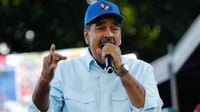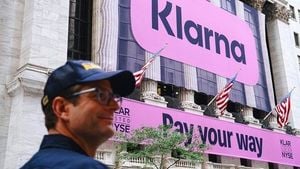In a dramatic escalation of tensions between Venezuela and the United States, recent weeks have seen a swirl of political asylum, international accusations, asset seizures, and military maneuvers, all centered on the embattled government of President Nicolás Maduro. Behind the headlines, the fate of dissidents, the reach of U.S. sanctions, and the specter of military confrontation are reshaping the region’s balance of power.
On August 6, 2025, Colombia granted political asylum to Maria Alejandra Diaz Marin, a Venezuelan lawyer and former chavista who has become a prominent critic of Maduro’s regime. According to Colombia One, Diaz had been sheltered since January at the Colombian embassy in Caracas, fearing persecution for her outspoken opposition to the government. In a video posted to her social media, Diaz expressed gratitude to Colombian President Gustavo Petro, Foreign Minister Yolanda Villavicencio, and Ambassador Milton Rengifo, as well as “the collaboration of dozens of anonymous heroes.” She declared, “We were able to leave the residence of the Colombian Ambassador in Caracas and are now safely on Colombian soil with part of our family.”
Diaz’s journey from Chavez loyalist to dissident is emblematic of a broader rift within Venezuela’s ruling movement. Once a key figure as president of the Human Rights and Constitutional Guarantees Commission of the now-defunct pro-Chavista National Constituent Assembly, Diaz broke ranks after denouncing what she described as irregularities in the 2024 presidential election. As Colombia One reports, she accused the National Electoral Council of “breaking the law” by refusing to publish disaggregated results that would substantiate Maduro’s controversial victory.
Her activism did not go unnoticed by authorities. In October 2024, Diaz and the Popular Democratic Front (FDP)—a coalition of dissident chavistas—filed a legal appeal demanding transparency in the election results. The Supreme Court rejected the request, and Diaz was subsequently fined, suspended from practicing law, and targeted by disciplinary proceedings. The Venezuelan government, for its part, denied any political persecution and rejected her request for a safe-conduct to leave the country, maintaining that Diaz was not being pursued by authorities.
President Petro publicly confirmed Diaz’s arrival and Colombia’s commitment to offering political asylum, writing on X, “Colombia is a country that guarantees political asylum. We hope for the return of all Colombians detained in Venezuela.”
Diaz is not alone in her dissent. Other former chavista leaders—such as Rafael Ramirez, Hector Navarro, and Cliver Alcala Cordones—have also broken with Maduro, denouncing corruption and authoritarianism. Many now live in exile or face prosecution, highlighting deep fractures within the Bolivarian project that once united Venezuela’s left.
While dissidents seek refuge, the United States has intensified its campaign against Maduro. On August 20, 2025, the U.S. government doubled its bounty on the Venezuelan president to a record $50 million, accusing him of being “one of the world’s largest narco-traffickers.” U.S. Attorney General Pam Bondi directly alleged that Maduro collaborated with the Sinaloa Cartel, Tren de Aragua, and the Cartel of the Suns to flood the U.S. with fentanyl-laced cocaine. The U.S. claims to have seized over $700 million in assets linked to Maduro, including jets and vehicles, as reported by AP and CNN.
The Venezuelan government, however, has dismissed these moves as “political propaganda,” suggesting that Washington is attempting to distract from its own controversies, including the ongoing Jeffrey Epstein scandal. Despite mounting charges, sanctions, and international condemnation of the disputed 2024 re-election, Maduro remains firmly entrenched in power.
The U.S. has not limited its actions to financial measures. On August 18, 2025, the Department of Justice announced the seizure of a Dassault Falcon 900EX jet used by Maduro and his associates. The aircraft, valued at $13 million, was seized in the Dominican Republic and transferred to federal officials in Florida. According to the DOJ, the plane had been purchased through a Caribbean-based shell company in an attempt to evade a 2019 executive order prohibiting U.S. business with the Maduro regime. The jet was then exported illegally to Venezuela in April 2023 and used for official government travel, including a high-profile prisoner swap in December 2024.
Attorney General Merrick Garland stated, “This morning, the Justice Department seized an aircraft we allege was illegally purchased for $13 million through a shell company and smuggled out of the United States for use by Nicolás Maduro and his cronies.” Homeland Security’s Anthony Salisbury added that the seizure represented “another significant action… against the illegal activities of the Maduro regime.”
These moves come on the heels of Venezuela’s July 2025 presidential election, in which Maduro’s government declared him the winner amid widespread opposition protests and a lack of detailed results. Opposition candidate Edmundo González was reported to have received nearly double the votes of Maduro, yet official tallies were not published, sparking accusations of electoral fraud and fueling unrest.
Against this backdrop of diplomatic and legal pressure, Maduro has responded with a show of force. On August 19, 2025, he announced the deployment of 4.5 million militia members across Venezuela in response to what he called “outlandish threats” from the United States. “This week, I will activate a special plan with more than 4.5 million militiamen to ensure coverage of the entire national territory—militias that are prepared, activated and armed,” Maduro declared on state television.
Official figures claim the Venezuelan militia, founded by Hugo Chavez, numbers about 5 million, though independent estimates suggest the real figure may be lower. With Venezuela’s total population hovering around 30 million, the move represents a major mobilization of the country’s resources. Maduro called on his supporters to form peasant and worker militias “in all industries,” exclaiming, “Rifles and missiles for the peasant force! To defend the territory, sovereignty, and peace of Venezuela.”
The U.S. has also ramped up its military presence in the region. Several naval vessels, including the USS Gravely, USS Jason Dunham, and USS Sampson, have been deployed to the southern Caribbean as part of a broader crackdown on Latin American drug cartels. According to Reuters and CBS News, these destroyers are expected to remain in the area for several months, signaling a sustained commitment to counter-narcotics operations and a clear warning to Maduro’s government.
For many Venezuelans, these developments are both a source of anxiety and a sign of the country’s deepening isolation. As opposition leaders and former insiders like Diaz seek safety abroad, and as U.S. authorities tighten their grip on assets and international movement, the Maduro government’s hold on power is increasingly defined by militarization and confrontation. Meanwhile, the international community watches closely, aware that the next move—by Caracas, Washington, or Bogotá—could tip the region into a new phase of crisis or, perhaps, open a path to dialogue and reform.
In a landscape marked by shifting alliances, legal battles, and saber-rattling, the fate of Venezuela remains uncertain, caught between the aspirations of its dissidents and the resolve of those still clinging to power.




